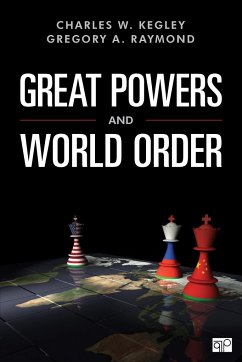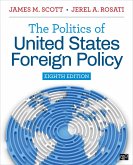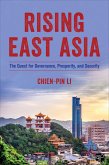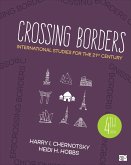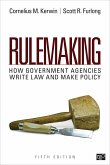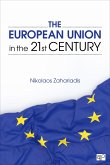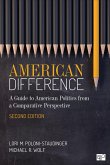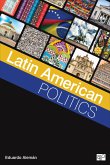Charles W. Kegley (USA University of South Carolina), Gregory A. Raymond (Idaho Boise State University)
Great Powers and World Order
Patterns and Prospects
Charles W. Kegley (USA University of South Carolina), Gregory A. Raymond (Idaho Boise State University)
Great Powers and World Order
Patterns and Prospects
- Broschiertes Buch
- Merkliste
- Auf die Merkliste
- Bewerten Bewerten
- Teilen
- Produkt teilen
- Produkterinnerung
- Produkterinnerung
Great Powers and World Order: Patterns and Prospects is a supplementary text for the Intro to IR course that focuses on the struggle for primacy among the great powers over issues of world order.
Andere Kunden interessierten sich auch für
![The Politics of United States Foreign Policy The Politics of United States Foreign Policy]() James M. ScottThe Politics of United States Foreign Policy198,99 €
James M. ScottThe Politics of United States Foreign Policy198,99 €![Rising East Asia Rising East Asia]() Chien-pin LiRising East Asia126,99 €
Chien-pin LiRising East Asia126,99 €![Crossing Borders Crossing Borders]() Harry I. Chernotsky (University of North Carolina, Charlotte, USA)Crossing Borders169,99 €
Harry I. Chernotsky (University of North Carolina, Charlotte, USA)Crossing Borders169,99 €![Rulemaking Rulemaking]() Cornelius Martin KerwinRulemaking100,99 €
Cornelius Martin KerwinRulemaking100,99 €![The European Union in the 21st Century The European Union in the 21st Century]() Nikolaos Zahariadis (USA Rhodes College)The European Union in the 21st Century115,99 €
Nikolaos Zahariadis (USA Rhodes College)The European Union in the 21st Century115,99 €![American Difference American Difference]() Lori M. Poloni-StaudingerAmerican Difference90,99 €
Lori M. Poloni-StaudingerAmerican Difference90,99 €![Latin American Politics Latin American Politics]() Eduardo AlemanLatin American Politics125,99 €
Eduardo AlemanLatin American Politics125,99 €-
-
-
Great Powers and World Order: Patterns and Prospects is a supplementary text for the Intro to IR course that focuses on the struggle for primacy among the great powers over issues of world order.
Hinweis: Dieser Artikel kann nur an eine deutsche Lieferadresse ausgeliefert werden.
Hinweis: Dieser Artikel kann nur an eine deutsche Lieferadresse ausgeliefert werden.
Produktdetails
- Produktdetails
- Verlag: SAGE Publications Inc
- Seitenzahl: 264
- Erscheinungstermin: 5. März 2020
- Englisch
- Abmessung: 228mm x 151mm x 17mm
- Gewicht: 422g
- ISBN-13: 9781544345833
- ISBN-10: 1544345836
- Artikelnr.: 57347137
- Herstellerkennzeichnung
- Libri GmbH
- Europaallee 1
- 36244 Bad Hersfeld
- gpsr@libri.de
- Verlag: SAGE Publications Inc
- Seitenzahl: 264
- Erscheinungstermin: 5. März 2020
- Englisch
- Abmessung: 228mm x 151mm x 17mm
- Gewicht: 422g
- ISBN-13: 9781544345833
- ISBN-10: 1544345836
- Artikelnr.: 57347137
- Herstellerkennzeichnung
- Libri GmbH
- Europaallee 1
- 36244 Bad Hersfeld
- gpsr@libri.de
Charles W. Kegley, Jr. (Ph.D. Syracuse University, B.A. American University) is a past president of the International Studies Association, who has served on the Board of Trustees of the Carnegie Council for Ethics in International Affairs for the last two decades. He holds the title of Pearce Distinguished Professor of International Relations Emeritus at the University of South Carolina, where he was Chairman of the Department of Government and International Studies and Co-Chair, with former U.S. Secretary of State Lawrence S. Eagleburger, of the Byrnes International Center. A former Pew Faculty Fellow at Harvard University, Kegley previously served on the faculty at Georgetown University, and has held visiting professorships at the University of Texas, Rutgers University, the People's University of China, and the Graduate Institute of International Studies in Geneva, Switzerland. He has served as the editor of The SAGE International Yearbook of Foreign Policy Studies, and has authored or edited over four dozen books on foreign policy and world politics, including eighteen editions of World Politics: Trend and Transformation, which has been translated into Arabic, Chinese, Hebrew, Korean, Serbian, Spanish, and Turkish.
Preface
Acknowledgments
About the Authors
PART I: THE VIOLENT ORIGINS OF THE CONTEMPORARY WORLD ORDER
Chapter 1 Great-Power Struggles for Primacy in the Modern Era
The Westphalian Foundations of the Modern State System
What Are Great Powers?
Regularities in Great-Power Behavior
Contending Approaches to World Order
Building World Order in the Aftermath of Hegemonic War
Key Terms
Chapter 2 World War I and the Versailles Settlement
The Origins of the First World War
The Armistice and Arrangements for a Peace Conference
Balance-of-Power Theory and World Order
Woodrow Wilson and The Liberal Tradition in World Politics
National Self-Interest Confronts Wilsonian Idealism
The Versailles Settlement
A World in Disarray
Key Terms
Chapter 3 World War II and the Birth of the Liberal Order
The Origins of the Second World War
Planning for a Postwar World Order
Spheres-of-Influence versus Universalist Models of World Order
The Political Economy of World Order
A World Divided
Key Terms
PART II: THE FITFUL EVOLUTION OF THE CONTEMPORARY WORLD ORDER
Chapter 4 The Cold War and Its Consequences
The Origins of the Cold War
The Course of the Cold War
The Characteristics of the Cold War
The Cold War World Order
Beyond the Cold War
Key Terms
Chapter 5 America's Unipolar Moment
American Primacy
Primacy and World Order
Democratic Peace Theory and American Foreign Policy
Rethinking State Sovereignty in an Era of Globalization
Anticipatory Self Defense and Preventive War
The Twilight of Unipolarity
Key Terms
Chapter 6 Unraveling the Liberal Order
Donald Trump and Conservative Thought on Foreign Policy
The Jacksonian Turn in American Foreign Policy
Power Without Principle
Key Terms
PART III: FORGING A NEW WORLD ORDER
Chapter 7 The Range of Great-Power Choice
Viewing System Transformation in Historical Context
Great-Power Options for Shaping World Order
Coordinated Consultation and World Order
Legitimacy and World Order
Key Terms
Chapter 8 Rethinking World Order
Change and Continuity in Contemporary World Politics
Critical Questions for World Order in the Twenty-First Century
The Quest for World Order
Key Terms
Suggested Readings
Glossary
Notes
Index
Acknowledgments
About the Authors
PART I: THE VIOLENT ORIGINS OF THE CONTEMPORARY WORLD ORDER
Chapter 1 Great-Power Struggles for Primacy in the Modern Era
The Westphalian Foundations of the Modern State System
What Are Great Powers?
Regularities in Great-Power Behavior
Contending Approaches to World Order
Building World Order in the Aftermath of Hegemonic War
Key Terms
Chapter 2 World War I and the Versailles Settlement
The Origins of the First World War
The Armistice and Arrangements for a Peace Conference
Balance-of-Power Theory and World Order
Woodrow Wilson and The Liberal Tradition in World Politics
National Self-Interest Confronts Wilsonian Idealism
The Versailles Settlement
A World in Disarray
Key Terms
Chapter 3 World War II and the Birth of the Liberal Order
The Origins of the Second World War
Planning for a Postwar World Order
Spheres-of-Influence versus Universalist Models of World Order
The Political Economy of World Order
A World Divided
Key Terms
PART II: THE FITFUL EVOLUTION OF THE CONTEMPORARY WORLD ORDER
Chapter 4 The Cold War and Its Consequences
The Origins of the Cold War
The Course of the Cold War
The Characteristics of the Cold War
The Cold War World Order
Beyond the Cold War
Key Terms
Chapter 5 America's Unipolar Moment
American Primacy
Primacy and World Order
Democratic Peace Theory and American Foreign Policy
Rethinking State Sovereignty in an Era of Globalization
Anticipatory Self Defense and Preventive War
The Twilight of Unipolarity
Key Terms
Chapter 6 Unraveling the Liberal Order
Donald Trump and Conservative Thought on Foreign Policy
The Jacksonian Turn in American Foreign Policy
Power Without Principle
Key Terms
PART III: FORGING A NEW WORLD ORDER
Chapter 7 The Range of Great-Power Choice
Viewing System Transformation in Historical Context
Great-Power Options for Shaping World Order
Coordinated Consultation and World Order
Legitimacy and World Order
Key Terms
Chapter 8 Rethinking World Order
Change and Continuity in Contemporary World Politics
Critical Questions for World Order in the Twenty-First Century
The Quest for World Order
Key Terms
Suggested Readings
Glossary
Notes
Index
Preface
Acknowledgments
About the Authors
PART I: THE VIOLENT ORIGINS OF THE CONTEMPORARY WORLD ORDER
Chapter 1 Great-Power Struggles for Primacy in the Modern Era
The Westphalian Foundations of the Modern State System
What Are Great Powers?
Regularities in Great-Power Behavior
Contending Approaches to World Order
Building World Order in the Aftermath of Hegemonic War
Key Terms
Chapter 2 World War I and the Versailles Settlement
The Origins of the First World War
The Armistice and Arrangements for a Peace Conference
Balance-of-Power Theory and World Order
Woodrow Wilson and The Liberal Tradition in World Politics
National Self-Interest Confronts Wilsonian Idealism
The Versailles Settlement
A World in Disarray
Key Terms
Chapter 3 World War II and the Birth of the Liberal Order
The Origins of the Second World War
Planning for a Postwar World Order
Spheres-of-Influence versus Universalist Models of World Order
The Political Economy of World Order
A World Divided
Key Terms
PART II: THE FITFUL EVOLUTION OF THE CONTEMPORARY WORLD ORDER
Chapter 4 The Cold War and Its Consequences
The Origins of the Cold War
The Course of the Cold War
The Characteristics of the Cold War
The Cold War World Order
Beyond the Cold War
Key Terms
Chapter 5 America's Unipolar Moment
American Primacy
Primacy and World Order
Democratic Peace Theory and American Foreign Policy
Rethinking State Sovereignty in an Era of Globalization
Anticipatory Self Defense and Preventive War
The Twilight of Unipolarity
Key Terms
Chapter 6 Unraveling the Liberal Order
Donald Trump and Conservative Thought on Foreign Policy
The Jacksonian Turn in American Foreign Policy
Power Without Principle
Key Terms
PART III: FORGING A NEW WORLD ORDER
Chapter 7 The Range of Great-Power Choice
Viewing System Transformation in Historical Context
Great-Power Options for Shaping World Order
Coordinated Consultation and World Order
Legitimacy and World Order
Key Terms
Chapter 8 Rethinking World Order
Change and Continuity in Contemporary World Politics
Critical Questions for World Order in the Twenty-First Century
The Quest for World Order
Key Terms
Suggested Readings
Glossary
Notes
Index
Acknowledgments
About the Authors
PART I: THE VIOLENT ORIGINS OF THE CONTEMPORARY WORLD ORDER
Chapter 1 Great-Power Struggles for Primacy in the Modern Era
The Westphalian Foundations of the Modern State System
What Are Great Powers?
Regularities in Great-Power Behavior
Contending Approaches to World Order
Building World Order in the Aftermath of Hegemonic War
Key Terms
Chapter 2 World War I and the Versailles Settlement
The Origins of the First World War
The Armistice and Arrangements for a Peace Conference
Balance-of-Power Theory and World Order
Woodrow Wilson and The Liberal Tradition in World Politics
National Self-Interest Confronts Wilsonian Idealism
The Versailles Settlement
A World in Disarray
Key Terms
Chapter 3 World War II and the Birth of the Liberal Order
The Origins of the Second World War
Planning for a Postwar World Order
Spheres-of-Influence versus Universalist Models of World Order
The Political Economy of World Order
A World Divided
Key Terms
PART II: THE FITFUL EVOLUTION OF THE CONTEMPORARY WORLD ORDER
Chapter 4 The Cold War and Its Consequences
The Origins of the Cold War
The Course of the Cold War
The Characteristics of the Cold War
The Cold War World Order
Beyond the Cold War
Key Terms
Chapter 5 America's Unipolar Moment
American Primacy
Primacy and World Order
Democratic Peace Theory and American Foreign Policy
Rethinking State Sovereignty in an Era of Globalization
Anticipatory Self Defense and Preventive War
The Twilight of Unipolarity
Key Terms
Chapter 6 Unraveling the Liberal Order
Donald Trump and Conservative Thought on Foreign Policy
The Jacksonian Turn in American Foreign Policy
Power Without Principle
Key Terms
PART III: FORGING A NEW WORLD ORDER
Chapter 7 The Range of Great-Power Choice
Viewing System Transformation in Historical Context
Great-Power Options for Shaping World Order
Coordinated Consultation and World Order
Legitimacy and World Order
Key Terms
Chapter 8 Rethinking World Order
Change and Continuity in Contemporary World Politics
Critical Questions for World Order in the Twenty-First Century
The Quest for World Order
Key Terms
Suggested Readings
Glossary
Notes
Index

